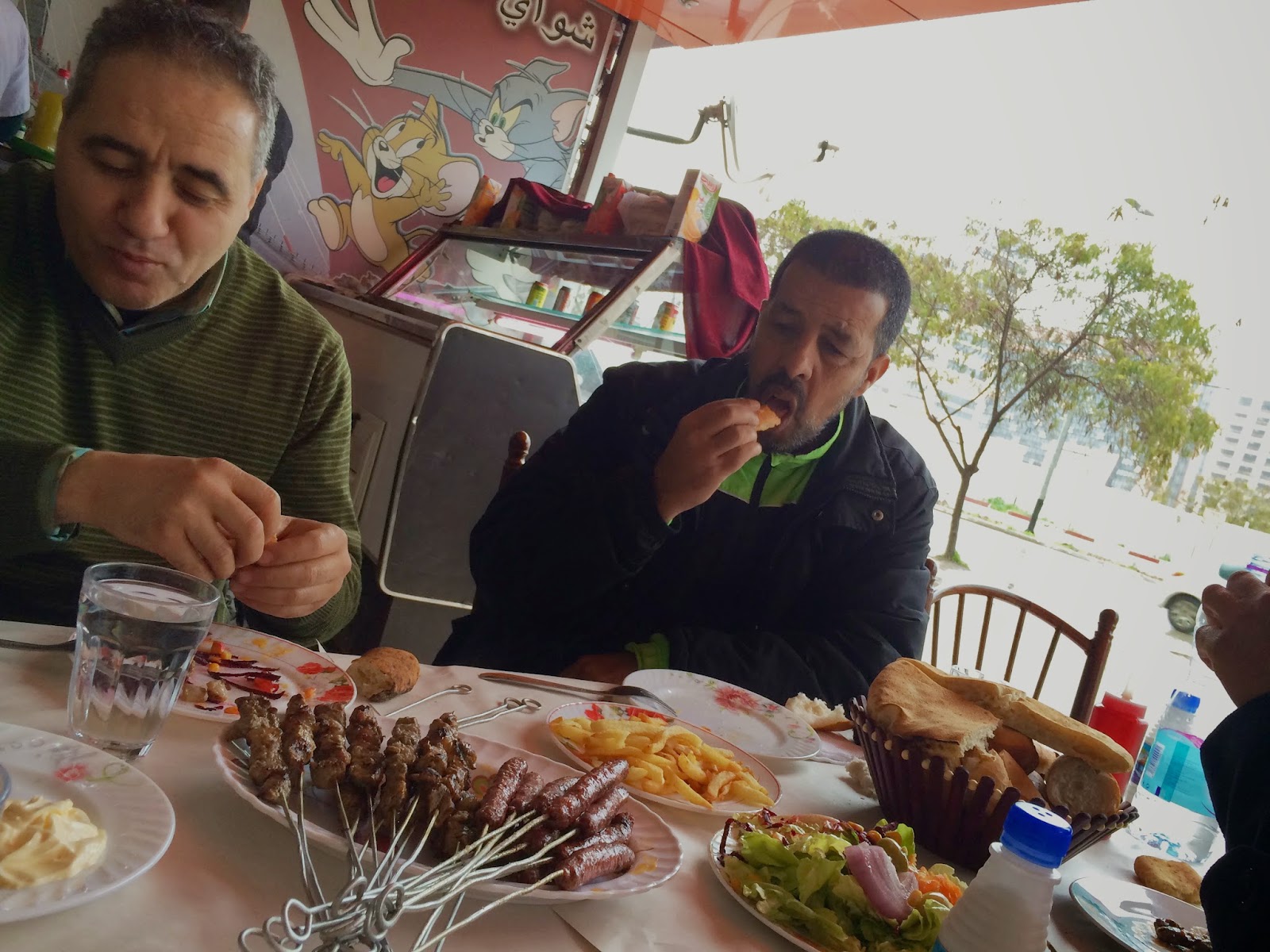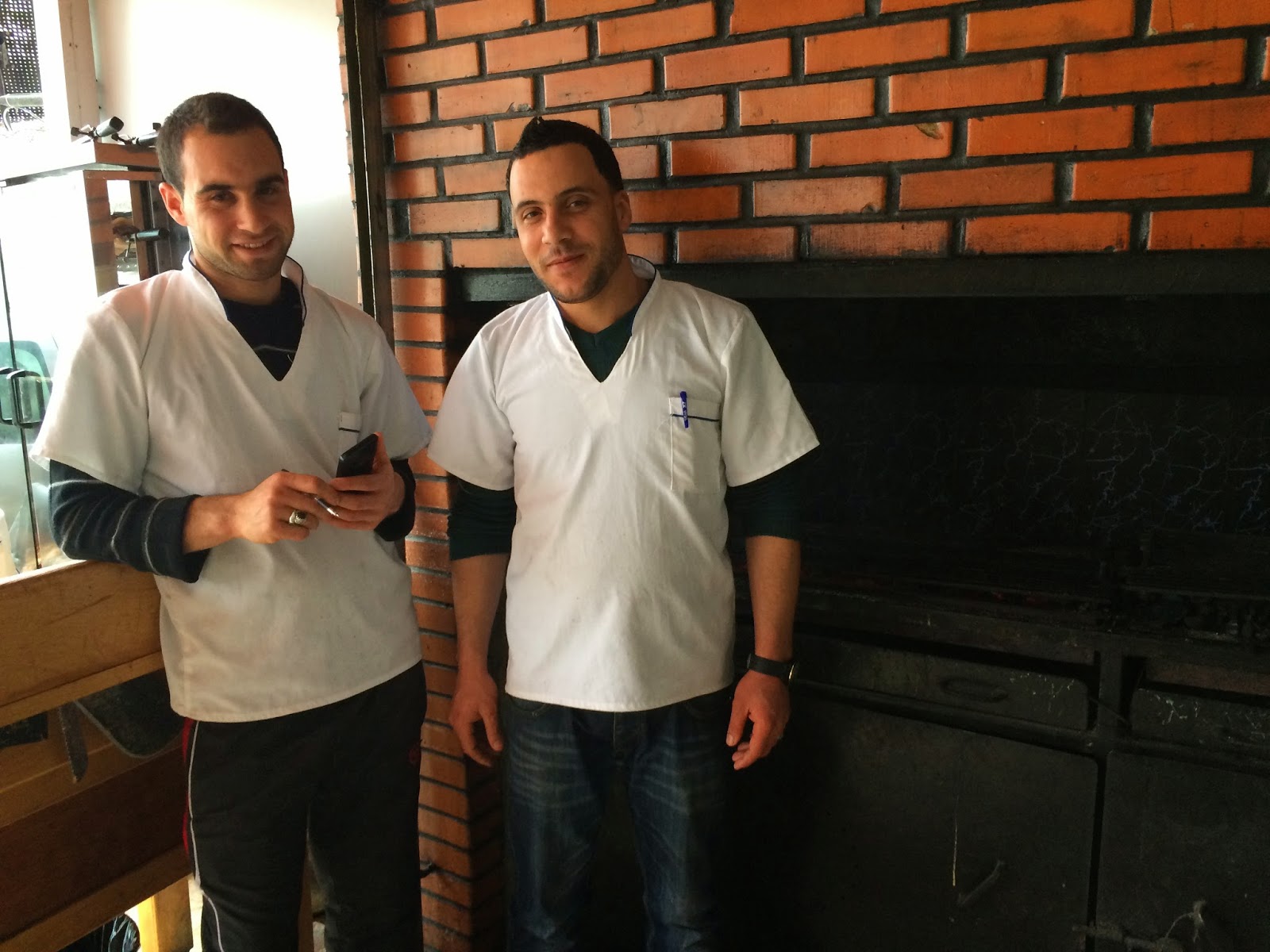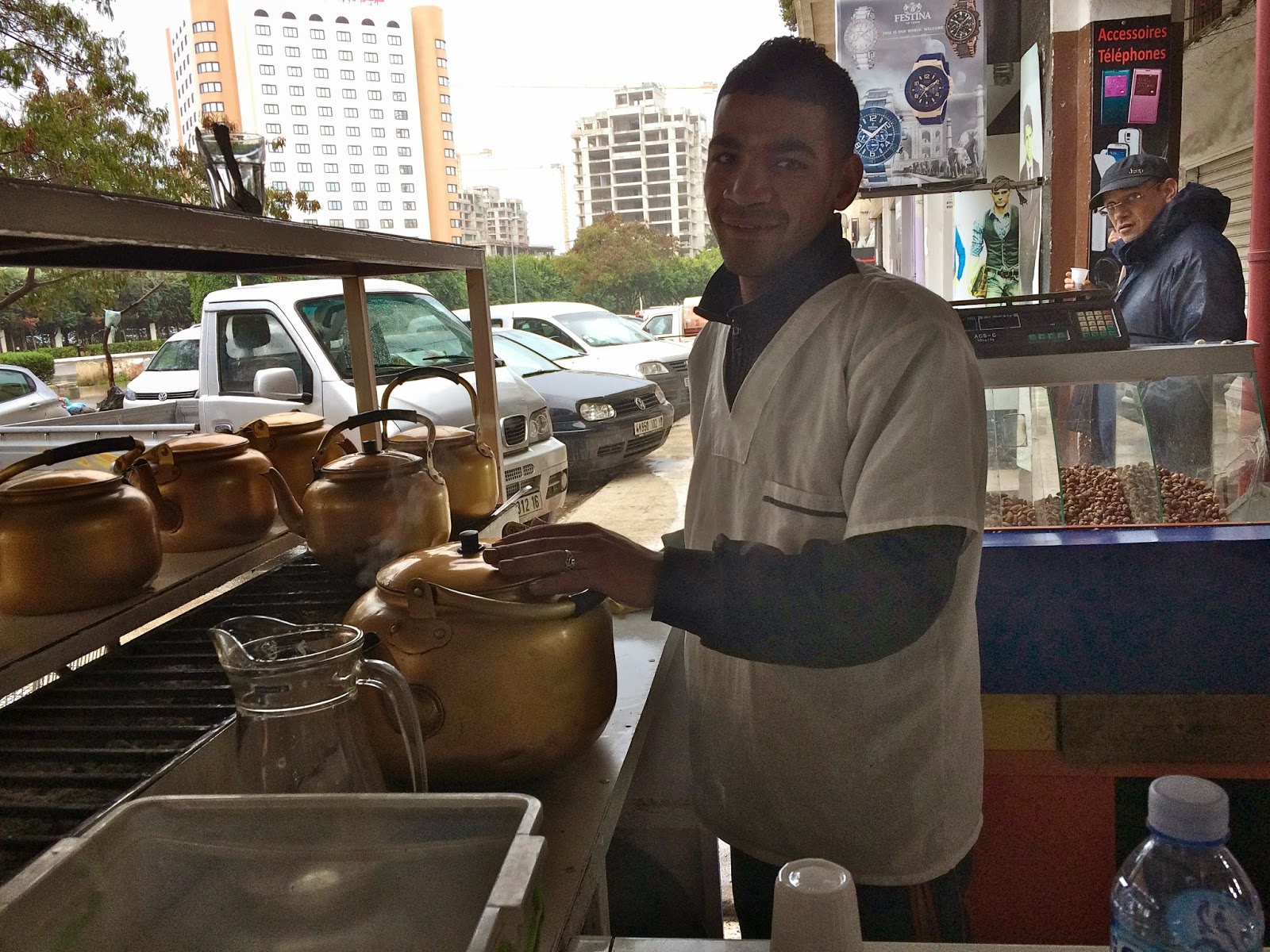But the day arrived and off we flew on a huge air france jet. Our seats were 49 ABandC, and I got the C, which meant I could see out the window. We leave Thursday night, arrive Friday morning 8:30 in Paris, take the 10:20 to Algiers, arrive at 1pm. "Easy." said Djelloul. "No problem. My friends, they pick us up with two cars, one for the luggage, one for us. We drive to Tiaret. Take maybe four hours through the mountains. Very beautiful. You'll love it. Fatmah, she make big feast for us. Lots of food. Big feast. Then we go to sleep. Easy."
Essentially a 32 hour day.
Easy. Flew easy in the low hum of the plane, watched a movie, slept some, munched the French food. OK, my ginger ale toppled over in the turbulence. No prob. Nearing the airport at dawn the land looked like a patchwork quilt of pale green and brown fields thrown over a down comforter. Red-roofed villages tucked in the seams, and hedgerows of trees, upright brushes, not in leaf yet, but thinking hard about it. We had left winter behind. Made connection, no prob. Flying over the south of france, the Friday morning sunlight gave way to some clouds that broke just as we neared the Mediterranean.
My first glimpse of the Mediterranean Sea, ever. Look at that color. "That's the sea of Homer, and Odysseus, I thought. Their ships plied those waves and escaped those shoals weathered mythic storms. Right down there. Then the clouds closed in again until we broke below them, above Algiers, and the patches were even greener.
Go to baggage claim and two pathetic pieces of luggage rode the belt over and over. The official was officially sorry. He spoke to Djelloul in French. A problem in Paris. The system broke down. Make out these forms, please. No, we can't deliver 400 miles away. No, we do not know when they will come in. We will tell you when we know. Lines. Forms. It is 2:30 when we meet our friends, waiting patiently for us. Here is Abdelkader, waiting to take our non-existent luggage. What to do? We wait? We wait.
I watch the crowd. Rock stops me from taking pictures of beautiful families, old men in turbans, the two Saudi's striding past in their white robes and rolexes, the ends of their red plaid head-scarves tossed casually back over their shoulders. Rock points to a scene I shouldn't miss. "Ask them if you can take their picture."
Uh-huh. Right. I click it anyway, and he looks nervously around for the eager-photographer police. Djelloul laughs at him. "It's OK." Rock wants postcards and we stop at a bookshop. Thought you'd appreciate this sampling.
His entourage of drivers consist of two friends for the baggage car and one for ours, driving Djelloul's car which he keeps in the garage in his home their. Djelloul hears a rumor that they will arrive at a 4pm flight. We decide to eat while we wait till the 4pm flight. "Not here." I say. "I came to see Algeria. Let's see it."
Il pleut. And puddles. There are huge crowds. It's like exiting Met stadium after a game. "Mecca" says Djelloul. They're all returning from Mecca.
We don't go far, of course. Ten minutes away we pull over to an open-air shops and this is the sight that greets us. I am hungry. "We Algerians, we are carnivores," he said.
Djelloul's dear friend, Moctar, our driver, on the left of Djelloul, and the other driver for the empty luggage car, Khaled, on the right. Djelloul, and one of the men for the empty luggage car.
The waiter looks at us grimly. Grimly takes Djelloul's order for us, platters of shish-kebob and sausage, and grimly goes off. "The waiters here," said Djelloul, "They don't know. They not too good with customers." Through an open door in the back young men sit at a table putting piles of cut up lamb or chicken on skewers. Two little children plat around them and through the shop. And, yes, that is Tom and Jerry on the wall.
The waiter plunks down the bread. Home-made mayonaise and hot sauce.
And the most tender and tasty smoked kebob I have ever tasted, and red sausage to die for, along with french fries and fresh salad. I ask where the grill was and he points behind me. The charcoal is in big chunks. The grim waiter puts on his real face, and I tell him how delicious his food is and can I take a picture? Djelloul tells him where I come from. I say Djelloul is a chef, too. and they chat. My friend, our waiter, is on the right.
Djelloul leads us on. "We have time for tea! I take you to my favorite tea place. Not too far.
Il pleut harder.
We dash under the awning -- and the awning is the roof of several tea places. I call it rue du golden tea pots. At each place where men gather (and you'll notice there are no women in any of these shops) golden-painted tea pots sit in a line on grills. Fresh pistachios are sold off of one side. (Very soft and tasty).
Our maestro du tea. He's just plopped a handful of wet mint tea leaves under the lid, poured in steaming water, then fills the glass pitcher with 2, maybe 3 cups of sugar.
And the show begins. I signal I want to photograph him and he is very pleased. Afterwards he and the men around us crowd around the phone to watch, grinning. He laughs. He is very pleased. Rock grins too. "You did good," he said.
We sip our little paper cups of sweet frothy tea, and head back to the airport.
In every town we passed, whether the places were kept up, like this, or run down, ("the people," Dj said, "they start building, and sometimes it takes a long time to finish) the pattern was the same -- open air shops, or shops behind some doors, or metal grates down on closed doors, and the apartments above.
Back at the airport the official essentially said, "4pm flight? Who told you that? 100% guarantee the bags will not be back today. Probably not tomorrow." Avant Tiaret. 4:30. This means we go through the mountains at night.
We pass fruit stands along the route. Irresistable.
And finally, on our way with only our carry-ons and the clothes on our back. But what does that matter? We've come to see Algeria. And here's Algeria. Djelloul asks, "Tell me, is this the picture you had in your head of Algeria?" No. The picture in my head was desert. Arabian desert. And look at this.
and this. We pull off the highway for a kilo of oranges. Twenty five cents.
on the way again. The fields are green with crops. A glimpse of a blooming tree here and there.
A tobac stop for one of the friends. It may be called "white house" this town, but maybe not.
Rock asks me to take a picture of this sign is for a toy shop. Most shops are closed for Sabbath. Friday night..
We wait a little more. The hills with palm trees cropping up over them back there -- kind of like they have bad haircuts. It's maybe 40 degrees.
It gets darker now,
Do you see the mountains in the distance? We were heading into higher mountains.
Did I mention il pleut?
We're on a divided highway for awhile, then there's a turn-off, and it's a two lane road the next few hundred miles to Tiaret.
These are great, high, lumbering mountains.
The roads on them have hair-pin turns.
Literally. The sign is a picture of a hair pin -- only with an extra bend in it.
And you know how when you get higher in the mountains it gets colder?
And did I mention it is now night?
And when the rain comes down in blinding sheets we do slow down enough to see the >>> >>> >>> come straight at us, and then the <<< <<< <<< and another >>> >>> >>> which puts us behind a truck.
Which we pass.
Into the dark.
and several cars, which we pass, into the dark.
Mile after mile, mile after mile.
There is an amazing calm in the car, though Moctar leans forward to see, one hand on the gear shift.
These mountains are old friends these old friends have driven since they were boys.
Suddenly we come upon an old truck lumbering ahead without lights. Moktar eases past skillfully.
Shall we call the others? In the car behind us? Warn them? " I ask. Djelloul reads the cell.
"They saw him. They're fine. Playing music. . ."
And thenSnow.
And we learn that when it snows this whole highway is closed, because it's too dangerous.
Really?
And the trucks they go hundreds of miles out of their way to go to Tiaret.
Moktar is a very skilled driver, because I'm writing this now.
And the car is a good car.
Djelloul says it has a sensor on it that tells you when the street conditions are icey, even when you don't know it. I wonder why he brings that up now.
High in the mountains on hair-pin turns, it reads icey and we slow to
40mph? 30?
And soon we're moving at 15 because the blinding sleet clattering on the car means we can't see the road too easy.
Diane, take your hands off you face, it's ok, says Rock.
"I know. I"m praying."
"He's a good driver."
"I know."
The "oh, we only have 45 miles to go" becomes,
45 minutes later,
"Oh, I should have said 100 miles back then.
Now, it's maybe 50 miles to go.
Two more towns. Maybe three.
And each town has speed bumps to watch out for. Which any town would do which has the main highway as its main street.
"The road straightens out soon, you see."
It does.
We come out of the mountains, and I fall asleep.
And five hours after leaving the airport we pull into Tiaret. I wake to see a great city resting in a rolling valley, lit up like cities are meant to be. And as if on cue, il pleut no more.
up to the house, open the iron gate, into the jardin, and Fatmah and our driver's beautiful wife and daughter greet us, -
with a feast
Shredded carrot and beet salad with olives and eggs, and fried pastry stuffed with ground chicken and goat cheese.
And roast chicken with meat-stuffed artichoke hearts and peas.
And lamb shank roasted in prunes, with sausage made of ground almonds, egg whites and cinnamon, soaked in the lamb/prune juices.
Fatmah, Djelloul's sister.
In the kitchen, where the women eat -- Fatmah, and Zohra (her name means rose -- the one who prepared all the dishes). And her daughter Sara, 17, -- quiet, sweet, graceful, kind.
And cloud-light chocolate cake with melted chocolate on merengue.
"You will eat very well" said Emma Nour.
"You will like the house."
A spacious and gracious home of marble tile floors and sitting rooms lined with sofas and bedrooms with great wardrobes and two wonderful baths and a big kitchen and a terrace and a roof patio with a view of the city and vast empty walls, that shake us up a little.
And a rose, a zahra, blooming in February in the little garden.
Oh, and no cat.
But we're looking.







































